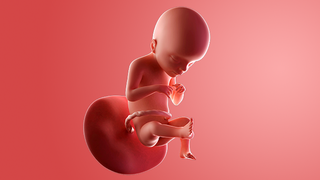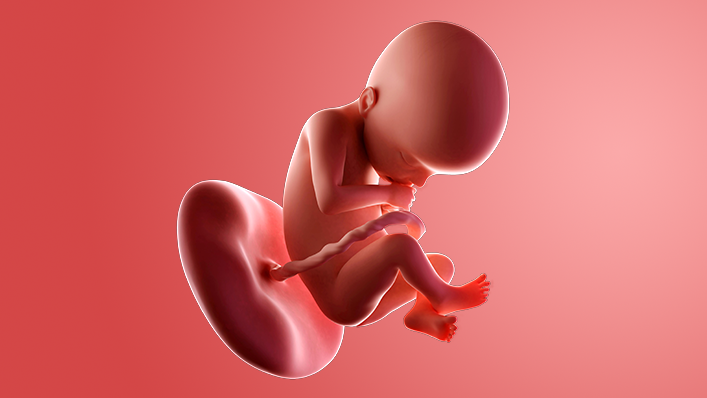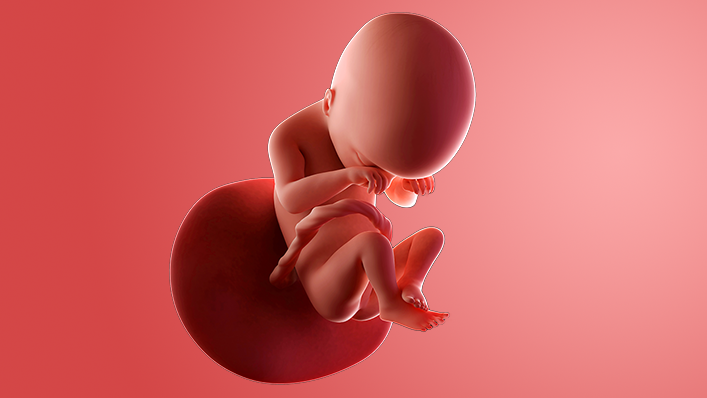What's happening in my body?
You may have your anomaly scan this week. The sonographer will be checking your baby's development and will also examine your placenta (that's the pancake-shaped organ that feeds your baby and removes waste).
You might find yourself being woken up at night by sudden sharp pains in your calves.
It's probably cramp, which is common in pregnancy and caused by muscular spasms. Rub the muscle hard or pull your toes up towards your ankle.
Exercising more in the day could help you avoid this, and you could try these foot exercises.
Maternity Certificate to claim maternity pay and benefits
Ask your doctor or midwife for a Maternity Certificate, also known as a MAT B1 form. It's issued from 20 weeks onwards.
You'll need it to claim maternity pay and benefits.
Whooping cough jab
Whooping cough is on the rise – but you can protect your baby from this dangerous condition by having a vaccination.
The NHS recommends that all pregnant women should have the jab, ideally between 16 and 32 weeks.
The immunity that you get will be passed on to your baby through the placenta and then offer protection until the routine jab that most babies have at 2 months.
2nd trimester pregnancy symptoms (at 20 weeks)
Your signs of pregnancy this week could include:
- tiredness and sleeping problems (week 19 has information about feeling tired)
- stretch marks (read about stretch marks on week 17's page)
- swollen and bleeding gums (week 13 has information about gum health during pregnancy)
- pains on the side of your belly, caused by your expanding womb (known as "round ligament pains")
- headaches
- nosebleeds
- bloating and constipation (read about bloating on week 16's page)
- indigestion and heartburn (week 25 talks about digestive problems)
- sore breasts
- leg cramps
- feeling hot
- dizziness
- swollen hands and feet
- urine infections
- vaginal infections (see week 15 for vaginal health)
- darkened skin on your face or brown patches – this is known as chloasma or the "mask of pregnancy"
- greasier, spotty skin
- thicker and shinier hair
You may also experience symptoms from earlier weeks, such as:
- morning sickness (read about dealing with morning sickness on week 6's page)
- weird pregnancy cravings (read about pregnancy cravings on week 5's page)
- a heightened sense of smell
- mood swings (week 8's page has information on mood swings)
- a white milky pregnancy discharge from your vagina and light spotting (seek medical advice for any bleeding)
What does my baby look like?
Your baby, or foetus, is around 25.6cm long. That's approximately the size of a banana.
Measurements are now taken from head to heel. In earlier weeks, babies are measured from the head to the bottom because the legs are curled up and hard to see.
They are now covered in a white, greasy layer of "vernix". It's thought this protects their delicate skin from drying out in the amniotic fluid. This slippery layer also helps babies to make their way down the birth canal.
Your baby will be getting more active each day. As well as kicking, punching and turning around, your baby could be sucking their thumb – this develops their sucking reflex, which they'll need to feed once they're born.
You may start to feel a bubbling or fluttering in your belly – this could be your baby moving around.

Action stations
More in week-by-week

Week 21
As you start the 2nd half of your pregnancy, you'll be entering a period of rapid growth. Your baby is getting ready for life outside the womb and developing essential skills including sucking and breathing.
More in week-by-week guide to pregnancy


